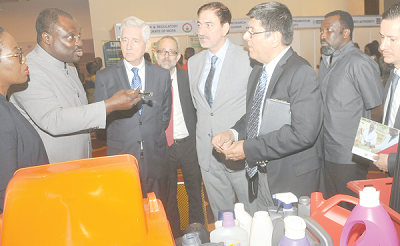The United Nations Industrial Development Organisation (UNIDO) has marked 10 years of trade cooperation with Ghana with a commitment to support the country to enhance its trade potential.
The support for Ghana will be geared towards ensuring that the country’s products conform to international specification standards and get connected to several international markets.
The UNIDO Representative to Ghana and Liberia, Mr Fakhruddin Azizi, made the pledge at the anniversary celebration in Accra yesterday.
The event marked 10 years of support which UNIDO, through the Swizz Government Secretariat for Economic Affairs (SECO), has given Ghana through the Ministry of Trade and Industry (MOTI) to ensure sustainable growth and development through its (SECO) Trade Capacity Building (TCB) programme.
The cooperation has helped Ghana to develop and revise more than 80 standards for the wood, fish, cocoa and fruits industries.
Cooperation
Mr Azizi said the combined efforts of UNIDO, SECO and MOTI had led to the development of an export hub being hosted by the Ghana Export Promotion Authority and the building of capacity at the various testing and inspectorate divisions in various institutions.
Besides, he said, through the partnership, 10 private sector enterprises had been supported to implement quality management standards and certified to relevant trade schemes.
Mr Azizi affirmed the commitment of UNIDO to continue to support enterprises to manufacture products with high export potential in terms of quality and quantity.
He again affirmed the commitment of UNIDO to improve the conformity of the country’s products meet relevant international standards, buyer and technical requirements.
“We will continue to support enterprises in their efforts to offer competitive, safe, reliable and cost effective products in world markets”, he said.
Ghana’s commitment
In his speech, a Deputy Minister of Trade and Industry, Mr Robert Ahomka-Lindsay, said the government was focused on improving the country’s export potential to generate enough revenue.
“Industry is at the centre of government plans to transform the economy from one reliant on its resources base to one driven by valueadded exports. The current administration is seeking to establish a factory in every one of the 254 districts with the intention of moving away from a dependence on cocoa towards a future in which the country can export automobiles and other high-value products”, he said.
Mr Ahomka-Lindsay said the government had a short-term plan to help distressed companies with a stimulus package, funded by the national budget and indicated that it formed part of a 10-point programme of reform known as the Industrial Transformation Agenda.
Trade Capacity Building
The UNIDO-TCB Programme Coordinator, Mr Victor Mills, said enterprises were required to manufacture products with high export potential to enable them to enter the international market.
The Swiss Ambassador to Ghana, Mr Markus Dutly, affirmed the commitment of the Swiss Government to continue deepening trade cooperation with Ghana.

